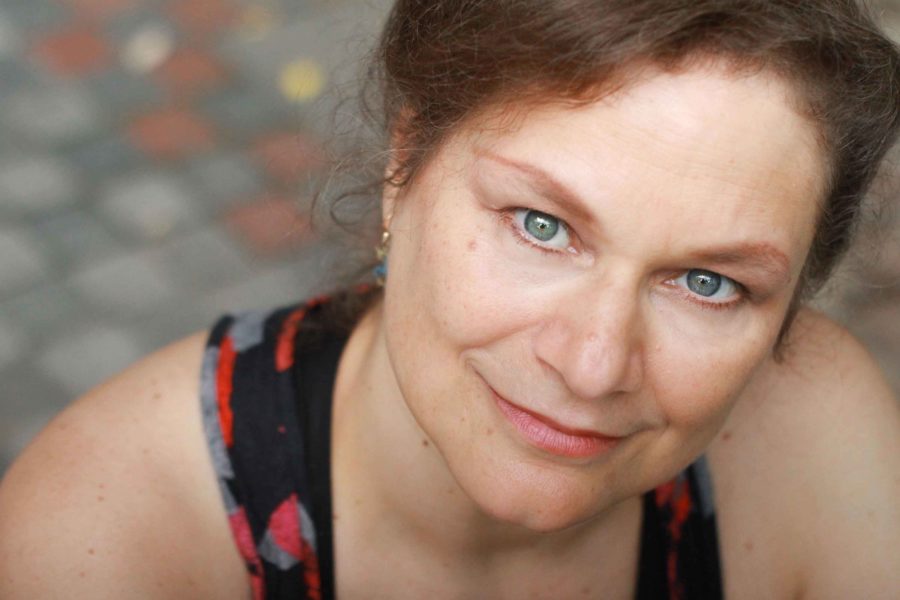Actress Anita Hollander has survived a lot. She’s dealt with multiple bouts of cancer and a resulting leg amputation, all while continuing to perform, get married, have a child and serve as an advocate for other disabled performers. Now she’s sharing her secrets of perseverance with Boston audiences in a month-long run of her one-woman show “Still Standing.”
We chatted with Hollander about her theater career, her connection to Boston and the life advice she shares in her show.

Exhale: What inspired you to write “Still Standing”?
Anita Hollander:The whole title of the show is “Still Standing: a Musical Survival Guide for Life’s Catastrophes.” I began writing it in 1977 when I went through cancer and chemo and radiation. I was in my junior year at Carnegie Mellon. [At the time] I wrote one song, which I thought was probably the most depressing song ever about when you’re lying in the hospital, and you’re not sure if you’re going to live or die. It’s called “The Choice.”
“The Choice” was the cornerstone of 16 years of writing, because that’s where it began. That’s the seed that grew into 16 songs in 16 years [that make up “Still Standing”]. In those years, I had cancer again, I lost a leg, I kept acting through everything. I went back on stage four weeks after I lost my leg at age 26. I got married, and I had a daughter. A lot of things happened in those years, and I just wrote songs about them.
By the time 1993 came along, I had what was essentially a show about survival. But, each song represented a tool for survival, something that got me through anything that happened. Such as a sense of humor or perspective, or chutzpah, imagination, family, love.

How have you managed to stay positive and keep moving through the challenges in your life?
When you’re experiencing enormous amounts of pain, the moments when you’re not in pain are extremely joyful. I get a real jolt of energy when I wake up in the morning, and I’m not in pain, and I can do things. I’ve had a tremendous drive all my life from the moment I was born. I’m blessed with energy and a very strong will. I don’t like to sit still, ever.

What do you think are the biggest misconceptions about people with disabilities?
The biggest myth of all is the Hollywood myth that actors with disabilities can’t play characters with disabilities. And that’s a myth that we’re busting wide open in television and in theater right now.
I’m the National Chair of the Performers with Disabilities Committee for SAG-AFTRA. I’ve been working for about four decades to get more inclusion of us in film and television. The myth is that if you have a disability, you’re not strong enough to do film and television and theater — which is the opposite of the truth. People with disabilities are usually stronger just to survive.
Any time Hollywood wants to say that they won’t make any money with an unknown actor with disabilities, they’re wrong. Millicent Simmonds, the young deaf actress who did “A Quiet Place,” was in “Wonderstruck” before that. Those two films did very well. This past summer there were about eight instances where Hollywood box office stars played disabled roles. And, it’s a little too late for that.

What are you most looking forward to about this Boston run?
My dream was to do a whole run of the show at an actual regional equity theater. I’ve never been asked to do a full run. There’s only one drawback: there’s no understudy in solo theater. Especially when you take your leg off in the show. So, I have to take very good care of myself.
My sister, Reverend Rachel Hollander is coming up to do ASL interpretation for one weekend (February 22-24). This whole run of the show in Boston is dedicated to Dr. Henry Mankin, who saved my life by amputating my leg in 1982 at Mass General. He just died in December at the age of 90, and without him I would probably not have lived.
He was crying when he told me he had to amputate, and I was like ‘I’ve got a show to open in four weeks, just go ahead and do it!’ This show is coming full circle of the story of my life.

What do you hope to give the audience during this performance?
I hope the audience comes away knowing that the tools for survival are not something you have to go out of yourself to get. They’re hardwired into you. Not that you shouldn’t ask for help when you need it. But, humor, and love, and imagination are all there.



 4 min read
4 min read


